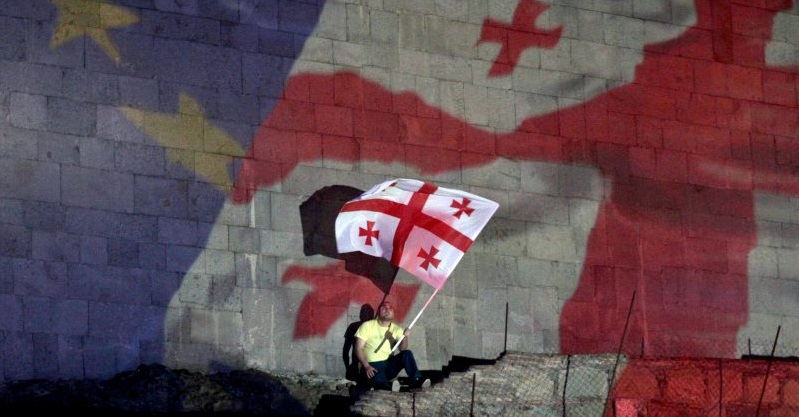EURACTIV: ‘The Commission’s Eastern Partnership strategy is disappointing’

A man holds a Georgian flag in downtown Tbilisi during the celebrations of a political and trade agreement with the European Union in Tbilisi, Georgia, 27 June, 2014. [Zurab Kurtsikidze/EPA/EFE]

EURACTIC has released a story by Andrius Kubilius, a member of the European Parliament and the Co-President of the Euronest Parliamentary Assembly, in which he says that ‘Georgia is better prepared for EU membership than the frontrunners of the Western Balkans.’
Kubilius, who is the former PM of Lithuania, also states that the European Commission’s recently produced ‘very important document’ about the future of the Eastern Partnership (EaP) ‘is disappointing.’
He says that before the coronavirus pandemic, the supporters of the EaP in the European Parliament, in addition to Ukrainians, Georgians and Moldovans, ‘were eagerly looking forward to this document.’
While awaiting this document we have discussed extensively, prepared and submitted strategic proposals, drafted the Trio Strategy – our vision for the future EaP. We were convinced, that the new European Commission, which voiced the ambition to be the ‘Geopolitical Commission’ will live up to this ambition in drawing the guidelines for the long-term perspective of its Eastern policy, one of the most important geopolitical vectors for the EU.
Kubilius says that ‘after reading the document I was disappointed – there is no geopolitical ambition in this document.’
He states that Ukraine, Moldova and Georgia can only succeed if the EU invests in their success.
The EU should invest not only money, it should also invest policy-wise by formulating smart and effective EU strategy towards the EaP countries. Such strategy should define an ambitious perspective – if the EaP countries demonstrate progress in the European reforms, the EU also moves forward by availing new support mechanisms and instruments for them, and, in the final stages by opening the doors to full integration of these countries (not only of the Western Balkans).”
At the end of the story Kubilius says that “I still hope that we can help the ‘Geopolitical Commission’ to return its geopolitical ambitions. We will be working towards that goal in the European Parliament, despite the pandemic. Of course, the pandemics should not be used as an opportunity to mask EU geopolitical weakness vis-à-vis Russia.’
Read the full story here.
 Tweet
Tweet  Share
Share
